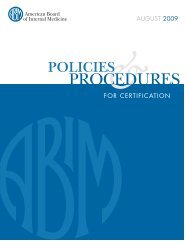The SRA Symposium - College of Medicine
The SRA Symposium - College of Medicine
The SRA Symposium - College of Medicine
You also want an ePaper? Increase the reach of your titles
YUMPU automatically turns print PDFs into web optimized ePapers that Google loves.
We <strong>of</strong>fer various trainings at both the department and college levels—arranging a special meeting<br />
time or joining a regularly scheduled departmental meeting. <strong>The</strong>se trainings include a combined<br />
“finding funding/submission process” presentation, hands-on funding searches within a computer<br />
lab using various searchable databases, and special sessions presented by visiting program <strong>of</strong>ficers.<br />
ISU hosted a regional NEH meeting on campus last year and brought several program <strong>of</strong>ficers<br />
from the State <strong>of</strong> Illinois on campus. This fall, we will be hosting an NSF day with program <strong>of</strong>ficers.<br />
This will be open to any institution in the state <strong>of</strong> Illinois.<br />
Sponsored Programs has devised several incentives programs in our attempts to encourage grantwriting<br />
efforts. Several universities are <strong>of</strong>fering similar incentives. A travel award program was<br />
instituted to provide funds for travel to meet with program <strong>of</strong>ficers, and/or cooperating institutions<br />
if directly related to grant-writing. <strong>The</strong> grant-writing initiative award is a new competitive<br />
program designed to provide dollars as an incentive to write grants as well. A recognition reception<br />
is held each spring to acknowledge all faculty/staff who submitted grants in the previous<br />
year—funded or not<br />
Some <strong>of</strong> the development activities aimed at the pre-submission stage are meetings with external<br />
funding agencies with the goal being to build relationships for future projects, and further into<br />
the lifecycle <strong>of</strong> a project, facilitating the application process. <strong>The</strong>re have been appointments with<br />
agency and program <strong>of</strong>ficers in Chicago, Springfield, and Washington, DC, about specific grant<br />
opportunities and research interests.<br />
Another activity we engage in is to arrange “brown bag” lunches with various faculty to discuss<br />
common research interests and potential funding sources. <strong>The</strong>se are promoted as multi-disciplinary<br />
efforts. Topics covered in the past include bioterrorism, geriatrics, teacher recruitment, and<br />
nursing. We also will “shop” projects to various funding agencies—researching hot topics, and<br />
then promoting those programs within the university that meet each funding agency’s priorities.<br />
And lastly, our assistant director in the development area will act as an ad hoc team member—<br />
writing abstract proposals, taking minutes at meetings and disseminating, and setting goals for the<br />
team. If external partners are identified, he arranges meetings with those individuals and coordinates<br />
the effort.<br />
<strong>The</strong> objective for all <strong>of</strong> these activities is to develop: (a) new ideas, (b) programs from existing<br />
ideas, and (c) relationships with collaborators and funding agencies to promote the programs. <strong>The</strong><br />
ultimate aim is to increase external funding providing resources that will allow the university to<br />
meet the needs <strong>of</strong> the student population and promote the transfer <strong>of</strong> services and technology to<br />
the general public.<br />
Conclusion<br />
Papers<br />
<strong>The</strong> rapid changes in society both in U.S. and internationally will cause institution <strong>of</strong> higher learning<br />
to have to become adaptable and flexible for change. Sponsored Programs Offices will become<br />
many times the drivers for change and will need to assist administration at institutions <strong>of</strong> higher<br />
education to assist in meeting with the community and developing strategies for finding the funding<br />
to provide services for projects, programs or centers.<br />
Strategic or long-term planning is a complicated process that needs the input <strong>of</strong> many participants.<br />
<strong>The</strong> questionnaire developed does not intend to take the place <strong>of</strong> these needed planning tools. Instead,<br />
the purpose <strong>of</strong> this suggested planning tool is to assist Research and Sponsored Programs by<br />
providing an abbreviated approach to begin assessing their ability to develop ways to respond to<br />
opportunities and demands either internally (institution <strong>of</strong> higher education) or externally (state,<br />
region or community) in providing additional services or demands.<br />
2005 <strong>Symposium</strong> Proceedings Book 159

















